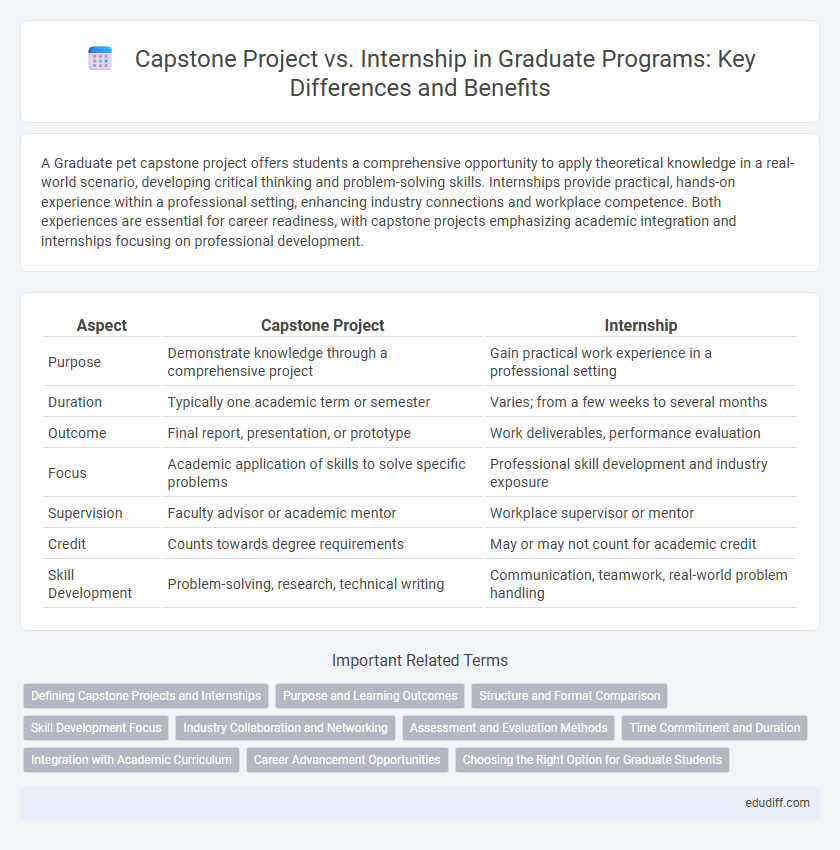A Graduate pet capstone project offers students a comprehensive opportunity to apply theoretical knowledge in a real-world scenario, developing critical thinking and problem-solving skills. Internships provide practical, hands-on experience within a professional setting, enhancing industry connections and workplace competence. Both experiences are essential for career readiness, with capstone projects emphasizing academic integration and internships focusing on professional development.
Table of Comparison
| Aspect | Capstone Project | Internship |
|---|---|---|
| Purpose | Demonstrate knowledge through a comprehensive project | Gain practical work experience in a professional setting |
| Duration | Typically one academic term or semester | Varies; from a few weeks to several months |
| Outcome | Final report, presentation, or prototype | Work deliverables, performance evaluation |
| Focus | Academic application of skills to solve specific problems | Professional skill development and industry exposure |
| Supervision | Faculty advisor or academic mentor | Workplace supervisor or mentor |
| Credit | Counts towards degree requirements | May or may not count for academic credit |
| Skill Development | Problem-solving, research, technical writing | Communication, teamwork, real-world problem handling |
Defining Capstone Projects and Internships
Capstone projects involve a comprehensive, research-based assignment culminating in a final presentation, designed to demonstrate a graduate's mastery of academic concepts and practical skills. Internships provide hands-on work experience within a professional setting, offering opportunities to apply theoretical knowledge to real-world tasks and develop industry-specific competencies. Both serve as critical components in graduate education, enhancing employability through practical engagement and skill validation.
Purpose and Learning Outcomes
The Capstone Project emphasizes integrating theoretical knowledge into practical solutions, encouraging critical thinking and problem-solving skills in real-world scenarios. Internships offer hands-on industry experience, fostering professional development and networking by immersing students in workplace environments. Both experiences aim to enhance a graduate's readiness for career challenges, with capstones focusing on academic application and internships prioritizing practical workplace exposure.
Structure and Format Comparison
Capstone projects typically follow a structured academic format with defined objectives, research components, and a final presentation or report assessed by faculty, emphasizing theoretical knowledge application. Internships offer a more flexible structure focused on practical work experience, real-world tasks, and mentorship within a professional setting without formal academic assessments. The capstone demands rigorous documentation and reflection, whereas internships prioritize hands-on skills and workplace integration.
Skill Development Focus
Capstone projects emphasize applying theoretical knowledge to solve complex, real-world problems, enhancing critical thinking and project management skills. Internships provide hands-on experience within a professional setting, fostering industry-specific skills and workplace communication. Both pathways develop practical competencies, but capstone projects prioritize research and innovation, while internships focus on experiential learning and skill application.
Industry Collaboration and Networking
Capstone projects often involve close collaboration with industry partners, providing students with real-world challenges and direct mentorship from professionals, which enhances practical skills and industry insights. Internships offer immersive work experiences within companies, enabling students to build extensive professional networks and gain firsthand exposure to workplace dynamics. Both pathways facilitate industry collaboration and networking, but internships typically allow for deeper integration into organizational cultures and ongoing professional relationships.
Assessment and Evaluation Methods
Capstone projects are typically assessed through comprehensive project reports, presentations, and peer evaluations, emphasizing critical thinking, problem-solving, and synthesis of learned concepts. Internships are evaluated based on supervisor feedback, performance appraisals, and real-world task completion, highlighting professional skills, workplace adaptability, and applied knowledge. Both methods use rubrics and reflective journals to measure student learning outcomes and practical competency development in graduate programs.
Time Commitment and Duration
Capstone projects typically require a concentrated time commitment over a single academic term, often spanning 8 to 16 weeks, allowing students to apply theoretical knowledge in a focused research or practical project. Internships usually extend over a longer period, ranging from 3 to 6 months or more, providing hands-on work experience in a real-world professional setting with variable weekly hours. The duration and time commitment differences influence the depth of experience and skill development gained from each graduate-level opportunity.
Integration with Academic Curriculum
Capstone projects integrate deeply with the academic curriculum by requiring students to apply theoretical knowledge to comprehensive, real-world problems, reinforcing concepts learned throughout their coursework. Internships offer practical experience but may vary in their alignment with specific academic objectives, often focusing on industry practices rather than academic theory. Capstone projects are designed to synthesize learning outcomes systematically, ensuring a cohesive educational experience that bridges classroom learning and professional application.
Career Advancement Opportunities
Capstone projects demonstrate a graduate's ability to apply theoretical knowledge to real-world problems, showcasing critical thinking and project management skills that attract potential employers. Internships provide hands-on experience and networking opportunities within a specific industry, often leading to job offers and career progression. Both pathways enhance a graduate's resume, but internships typically offer more direct avenues for career advancement through practical exposure and professional connections.
Choosing the Right Option for Graduate Students
Graduate students must weigh the practical experience gained from internships against the comprehensive research and problem-solving skills developed in capstone projects. Internships provide direct industry exposure and networking opportunities essential for career entry, while capstone projects enhance critical thinking and specialized knowledge through in-depth academic challenges. Selecting the right option depends on career goals, with internships suited for immediate professional immersion and capstone projects ideal for those pursuing advanced expertise or graduate studies.
Capstone Project vs Internship Infographic

 edudiff.com
edudiff.com